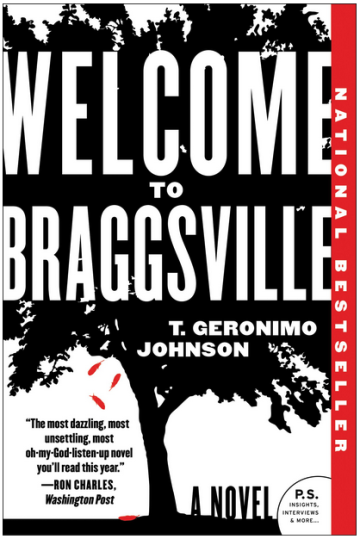WELCOME TO BRAGGSVILLE by T. Geronimo Johnson
Welcome to Braggsville (William Morrow) is the story of D'aron Little May Davenport, valedictorian of Braggsville (“The City that Love Built in the Heart of Georgia, Population 712”) high school and t UC “Berzerkely” undergrad. Davenport and his three idealistic best friends and Cal classmates are the “4 Little Indians,” so dubbed after placing dot-party stickers (place the dot where you want to be touched) on their foreheads like bindi. Their minds newly opened to structure and power and theory by Chomsky and Zinn, they decide, for a class called “American History X, Y, and Z: Alternative Perspectives,” to performatively intervene in Braggsville's annual Civil War Reenactment by reenacting a lynching during the battle.
The 4 Little Indians -- Charlie, Louis, Candice, and D'aron, black, Asian, female, and white, respectively -- go to Braggsville, where their insular, neat academic ideals meet the messy world of prejudice and law. Braggsville is first-rate satire; as such, it is, to steal an idea I thought I first read in Lolita (a Cambridge-educated cousin of Braggsville and intriguing reference point) fruit salad of ideas, a perfect example of the form.
A phrase certainly found in Nabokov speaks to T. Geronimo Johnson's work closely: “You can always count on a murderer for a fancy prose style.” Johnson is indeed an ingenious and fancy prose stylist. His seemingly bottomless capacity for allusion is outshined only by his prodigious knowledge of the lexicon that foregrounds those allusive territories. That is to say, with murderously authentic ease he dances—and it is a dance, an art in motion—between Deep South cant, police interrogative, cultish euphemism, Ebonics, college humor argot, academic liberal-ese, legal-ese, and other “lects”.
One gets the feeling these myriad, fruit-salad voices are not allusive at all, there is no implicit distance-making in them, rather they are evidence of a contemporary world exactingly, transcendently represented from its inside. Coordinately, on every single page, there are instances of craft and phrase as flamboyant and incandescent as anything in Lolita, but without so much attention paid to contrivance and refinement. Johnson's writing is organic, rough & tumble, downhome, more explicitly comedic. You know the famous sonorant entrée into Lolita; here is Braggsville's plosive start:
D'aron the Daring, Derring, Derring-do, stealing base, christened D'aron Little May Davenport, DD to nana, initials smothered in Southern-fried kisses, dat Wigga D who like Jay Z aw-ite, who's down, Scots-Irish it is, D'aron because you're brave says Dad, No, D'aron because your daddy's daddy was David and there was mines who was named Aaron ...
The sentence goes on, as many do, in a twined ivy of voices, a dense thicket of association and language, often abstruse and on the whole, surprisingly surreal and modernist. Think of Southern Gothic writers like Faulkner and Flannery O'Connor crossed with David Foster Wallace and, of course, Nabokov. In Braggsville, such disparate, dissonant voices find a home under the wide embrace of the American Absurd.
As it must be with great art—and Welcome to Braggsville is, mostly, great—the means are suited perfectly to their end, and vice versa. Johnson writes enthralled by clashing hermetic discourses, in many tongues, because he wants to annihilate their linguistic exceptionalism, atomize the boundaries with force. Because this is his mission, this is how he must write. His narrator, not a killer of humans like Humbert Humbert, is a third-person murderer of the symbolic: a firebrand iconoclast, for which no one, or thing, is untouchable. Political correctness, the no-touch of language, is the enemy, and the not-so-subtle prejudices given warm shelter underneath.
The town of Braggsville, which ends up taking the novel's main stage too often (the stage itself takes the stage for about fifty pages—there's a sort of emptiness about that stretch, no matter how lush the language with which it is presented), is a manifestation of that unsubtle exceptionalism, with its de facto segregation (the black population literally lives in a forest that whites superstitiously fear) masquerading as equilibrium.
The strongest moment in the entire book is an interrogation of three of the Indians by the Braggsville sheriff.
Fugue-like, each voice emerges as a linguistic theme, but themes retrenched in safe discourses in the suppressing face of the sheriff's authority. We feel the walls closing in, the injustice of a system that makes appearances criminal. Equilibrium isn't equal, Welcome to Braggsville needs you to know—and in the heat of its satiric fervor, we learn.
T. Geronimo Johnson, born and raised in New Orleans, received his M.F.A. from the Iowa Writers' Workshop and his M.A. in language, literacy, and culture from UC Berkeley. He has taught writing and held fellowships—including a Stegner Fellowship and an Iowa Arts Fellowship—at Arizona State University, the University of Iowa, UC Berkeley, Western Michigan University, and Stanford. His first novel, Hold It 'Til It Hurts, was a finalist for the 2013 PEN/Faulkner Award for fiction. Johnson is currently a visiting professor at the Iowa Writers' Workshop. He lives in Berkeley, California.

